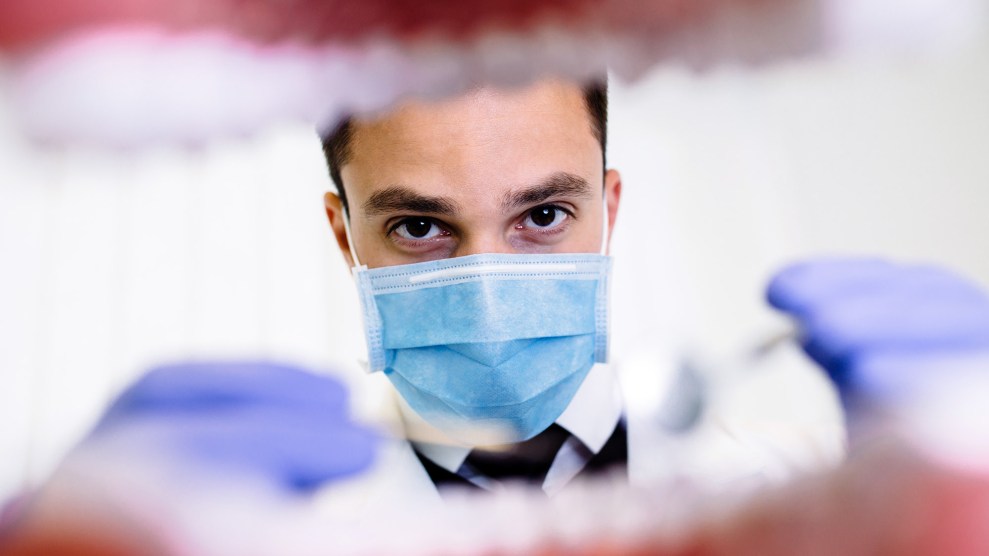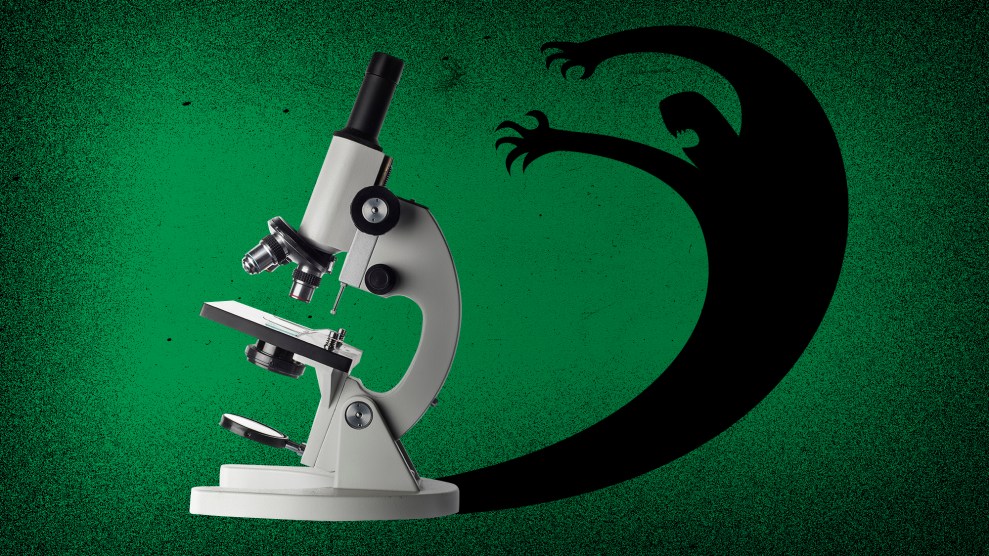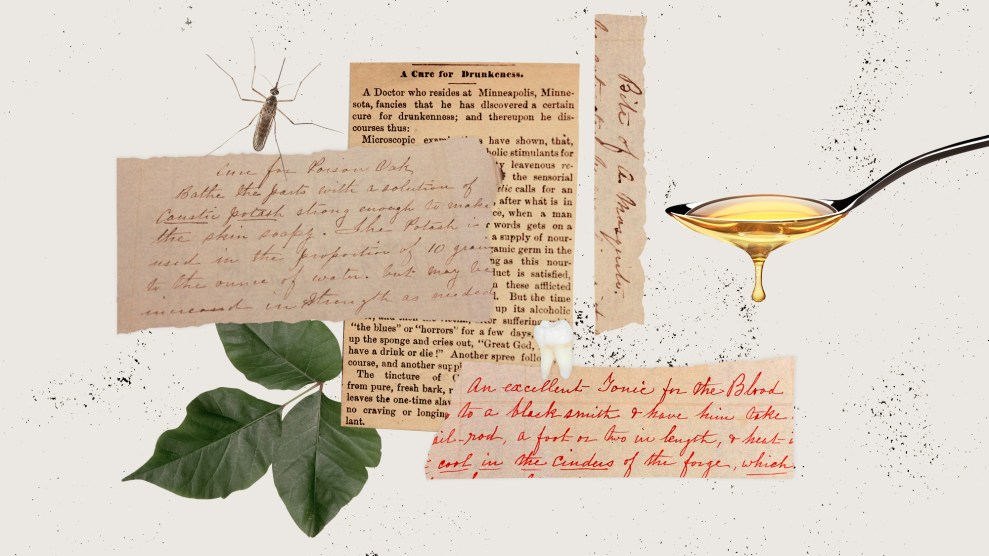
DuxX/Getty
I’ll admit that one of the nice things about being stuck at home has been indefinitely postponing my next dental appointment. So I felt a twinge of guilt the other morning when an email from my dentist’s office popped into my inbox. But it had more urgent business than reminding me to floss: “The COVID-19 pandemic is a rapidly developing situation. We here at [office name redacted] are concerned about you, the patient.”
The message continued: “Hydrogen peroxide (H₂O₂) appears to be another potential treatment for COVID-19.” This common compound, it explained, is “an oxidizing agent, which means that it can kill living cells, such as bacteria.” (Isn’t the coronavirus a… virus?) “To help prevent the spread of COVID-19,” my dentist’s office was offering a foaming peroxide gel which I could put on my teeth for 15 to 20 minutes at a time:
The foaming helps clean the area, remove dead cells, and reduce bacteria which helps prevent the spread of the virus and can actually slow it down from spreading to the lungs if you do have it.… If you know you need to go out, when you return home, use the solution immediately to prevent the virus.
Just $100 for six applications (not including a mouth tray)!
Needless to say, I didn’t bite. There were plenty of red flags in the email, starting with its casual description of hydrogen peroxide as possible way to both prevent and treat COVID-19. Then there was the lack of any mention that this protocol had been approved by the Food and Drug Administration, the American Dental Association, or another reputable organization. It did mention, however, that H₂O₂’s potential COVID-fighting powers had been noted by the Centers for Disease Control and Prevention. Unsurprisingly, a search failed to turn up any evidence that the CDC has okayed putting hydrogen peroxide, a topical disinfectant, into your mouth to stop the coronavirus.
The message also cited a Dr. Thomas Levy, the author of books such as Death By Calcium, Curing the Incurable, and Magnesium: Reversing Disease (from the blurb: “magnesium is the natural antidote for the root cause of all pathalogical [sic] damage from every disease and poisoning known to man.”) During the 2014 Ebola outbreak, Levy suggested that the virus could be “destroyed naturally” with massive doses of vitamin C.
Levy has also boosted the purported curative properties of hydrogen peroxide. In March, a blog republished an article in which he advocates using a nebulizer to inhale a three-percent solution of peroxide to fight the coronavirus. “Because you now have a simple, inexpensive, and effective way to conquer virtually all viral infections,” he writes, “you do not have to live in fear of COVID-19 or any other pandemic.” Dr. Joseph Mercola, the anti-vaccine dietary supplement guru, also suggests aerosolized peroxide as a possible coronavirus blocker.
Back in the real world, hydrogen peroxide has non-kooky applications as a mouthwash and teeth whitener. It is considered safe in low doses, though Today’s RDH, a publication for dental hygienists, warns that rinsing with undiluted peroxide can can cause a benign condition known as “black hairy tongue,” which is exactly what it sounds like. It also comes in brown, yellow, green, blue, and colorless varieties. (Take my word and do not do an image search for this.) And too much exposure to peroxide can also cause chemical burns and tissue damage.
Yet I could not find any recommendations that peroxide gel should be used orally to stop the spread of coronavirus. The American Dental Association’s guidelines for treatment during the current pandemic say that dentists may have patients rinse their mouths with a hydrogen peroxide solution before receiving care. In a recent video, Dr. Dave Preble, the senior vice president of the ADA’s practice institute, explains that while hydrogen peroxide may kill the coronavirus in the mouth, that hasn’t been clinically proven. And, he continues, “considering that the microscopic particles that we are trying to be protected from are coming from the patient’s lungs, a mouth rinse is not going to be a panacea—unless you’re going to have the patient rinse after every breath they take.”
Having done a little homework, I wrote an angry email to my dentist’s office, saying that I found its message irresponsible and misleading, particularly at a time when people are desperate for reliable information about the coronavirus.
Not long afterwards, I got a reply from the office manager, who said she had written the email and reassured me she had only described hydrogen peroxide as a potential COVID-19 treatment—“Key word being potential.” She included a link to a company that sells a whitening gel that contains hydrogen peroxide, which made me suspect that this had been a clumsy attempt to repackage tooth whitener as a coronavirus therapy.
Later, I received a more detailed response from my dentist, who apologized for his office manager’s “confusing” message and disavowed the reference to Levy. Yet he doubled down on the original email’s endorsement of hydrogen peroxide. He said that there is “new research suggesting peroxide gels can help fighting the coronavirus.” He attached a couple of non-peer-reviewed articles; one was written by the CEO of a peroxide gel maker. He also stated that the Environmental Protection Agency “recommend[s] using the hydrogen peroxide gels for use against SARS-CoV-2” and included a screenshot of the agency’s list of disinfectants that can be used on the coronavirus. I visited the EPA’s site; it very clearly states, “These products are for use on surfaces, NOT humans.”
I was astounded. Less than a month after President Trump had wondered if injecting disinfectant could kill coronavirus, a medical professional was blurring the line between using hydrogen peroxide to kill viruses on hard surfaces and its potential for internal use. The whole thing smacked of misguided opportunism. However, my dentist insisted that he wasn’t trying to make a quick buck. In his email to me, he said that dentists are desperate for peroxide products right now and that he “would make huge profits” if he sold his inventory to his colleagues.
On the bright side, I suppose, the only side effect of trying to clean the coronavirus out of your mouth with peroxide is a whiter smile (or maybe a discolored, hairy tongue). Anyway, I really need to find a new dentist.


















